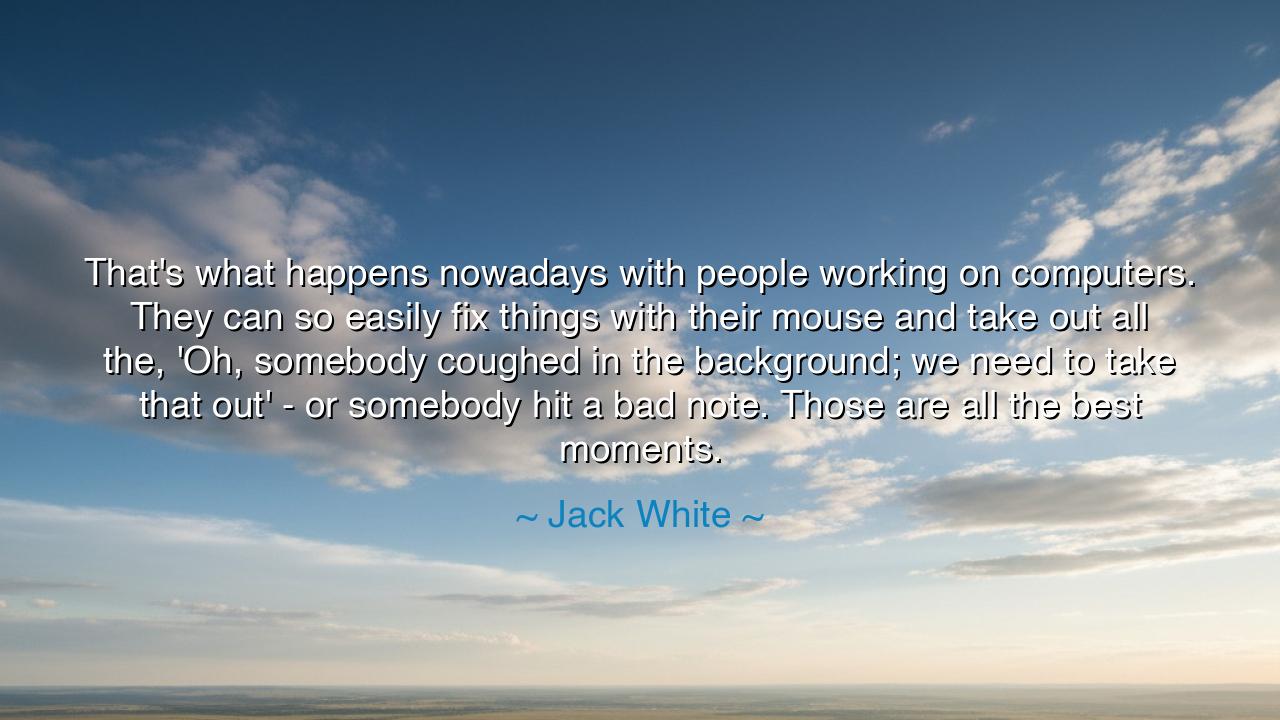
That's what happens nowadays with people working on computers.
That's what happens nowadays with people working on computers. They can so easily fix things with their mouse and take out all the, 'Oh, somebody coughed in the background; we need to take that out' - or somebody hit a bad note. Those are all the best moments.






When Jack White said, “That’s what happens nowadays with people working on computers. They can so easily fix things with their mouse and take out all the, 'Oh, somebody coughed in the background; we need to take that out' — or somebody hit a bad note. Those are all the best moments,” he spoke with the voice of one who has walked the tightrope between perfection and imperfection. White, a man known for his raw, gritty approach to music, recognized that in this modern age of digital manipulation, we risk losing something essential — the spontaneity and humanity that breathe life into art. His words challenge the idea that perfection lies in flawless execution, instead suggesting that the soul of a song — of any creation — often resides in its flaws.
In the age of computers, it has become almost too easy to smooth away the edges of creativity, to erase the imperfections that once made a moment alive. With the click of a mouse, a cough can be silenced, a wrong note can be corrected, and a performance that was once organic can become sterile, polished, and predictable. But as Jack White so wisely observes, it is imperfection that captures the heart of an audience. It is the mistakes, the moments where the artist is most vulnerable, that create the connection between performer and listener. A human cough is a reminder that the person creating the art is not a machine, but a living, breathing being. The wrong note is a sign of passion, a moment of authenticity, where the artist’s soul spills out in an unguarded burst.
History, too, is full of moments where imperfection became immortal. Ludwig van Beethoven famously composed the Ninth Symphony, despite his profound deafness. The music, filled with raw emotion and imperfect harmonies, became the embodiment of human resilience and expression. The imperfections in Beethoven’s works, shaped by his struggle with his own mind and body, became part of the music’s transcendence. Would those works be remembered with the same reverence if they had been sanitized, perfected, and devoid of their creator’s heartache? Perhaps not. The flaws are what make us human, and through them, we touch the divine.
Consider the early recordings of the blues, where the crackle of the vinyl, the imperfect vocal tones, and the occasional background noise were not distractions, but essential to the authenticity of the music. Artists like Robert Johnson, whose guitar playing and singing were raw and unrefined, created soulful sounds that resonated far beyond the boundaries of their time. If those recordings had been cleaned up, stripped of their imperfections, would they have carried the same weight? Would they have touched the hearts of those who listened in secret, finding in them the echoes of their own struggles and passions?
Jack White’s warning against over-manipulating art is not just for musicians, but for anyone engaged in creation. Perfectionism can be a subtle trap. It promises a false ideal, telling us that only the flawless has value. But the truth is that flaws are the path to connection. The mistakes, the mistakes that the digital world so easily erases, are what make us real. They remind us that behind every work of art, there is a human being struggling, striving, and hoping to make something that is not just right, but true. And in truth, there is beauty.
The lesson Jack White offers us is a call to embrace the imperfect. We live in a world that often rewards precision and flawlessness, but art, creativity, and life itself are richer when they embrace the chaos, the messiness, and the imperfections that make them unique. To strive for perfection is to miss the point — the soul of a creation lies in the imperfections that make it alive.
Practical actions for those who create:
-
When creating, do not fear mistakes; let them be part of your process. Embrace the unpredictable moments, for they are often the most beautiful.
-
Remember that authenticity matters more than perfection. In your work, let your humanity shine through, even if it’s a bit rough around the edges.
-
Record life as it is, with all its imperfections. Be not afraid of the unpolished, for it is in the rawness of existence that we find its deepest meaning.
-
When you find yourself trying to perfect something, ask: What might I lose in the pursuit of perfection? Then, give yourself the freedom to leave it imperfect.
For, as Jack White reminds us, perfection is not what connects us to one another — it is the imperfect moments, the ones where we see the human behind the art, that create the bond. Embrace the flaws in your life and work, for it is through those cracks that the light of your soul shines brightest.






AAdministratorAdministrator
Welcome, honored guests. Please leave a comment, we will respond soon